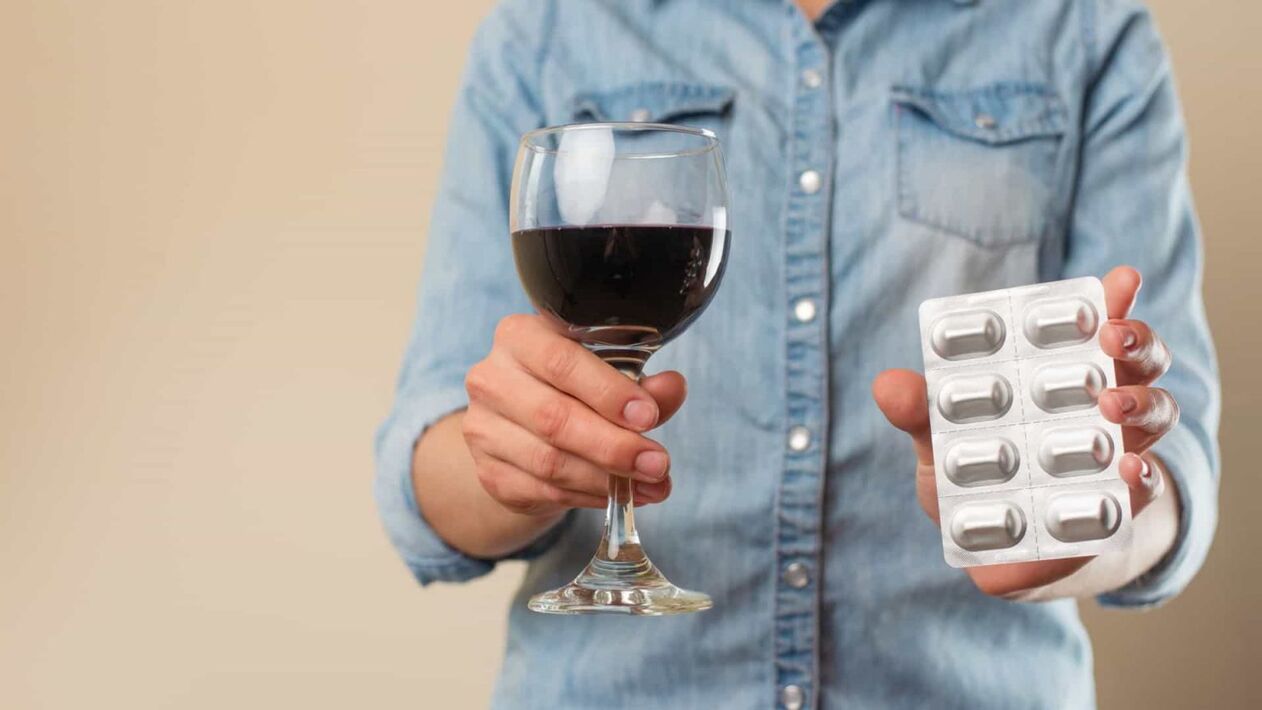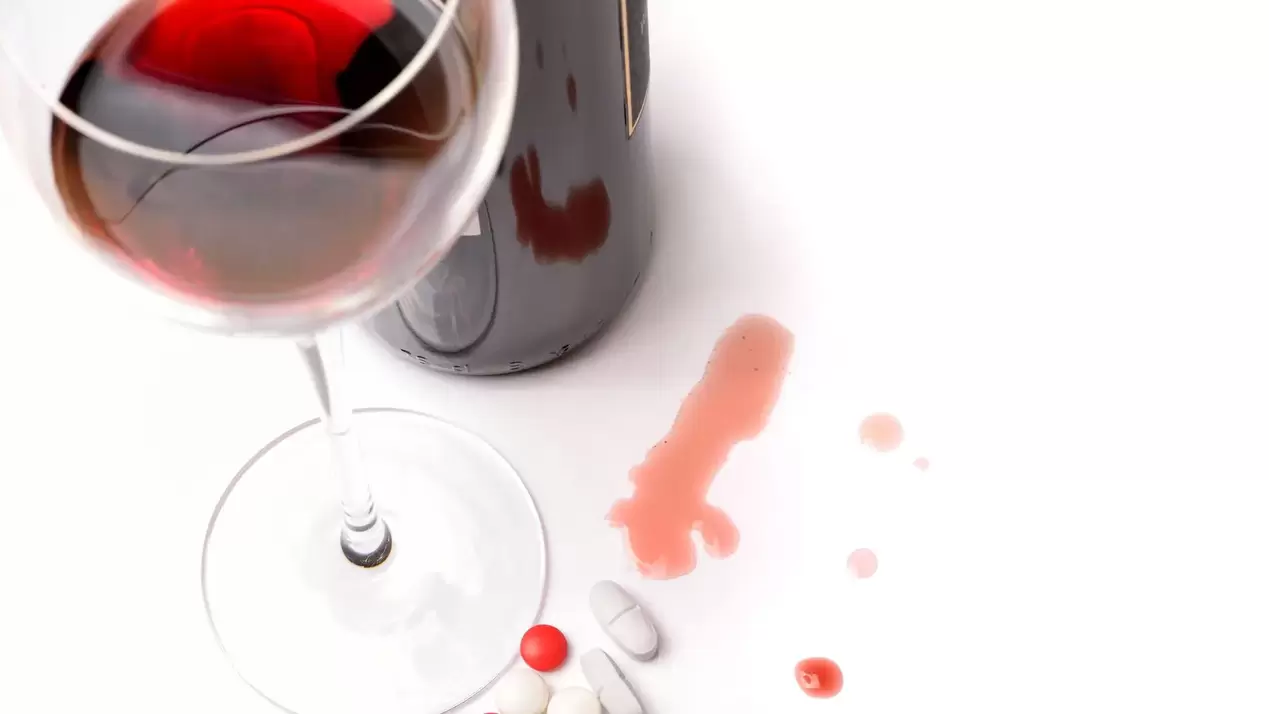Sometimes the dentist prescribes a course of antibiotic treatment to the patient.This happens with bacterial infections of the mouth.You must take antibacterial drugs, adhering to certain rules, which your doctor will tell you separately.One of the most frequent questions is whether it is possible to combine antibiotics and alcohol?We talk about this in detail in our material.
Is it possible to drink alcohol with antibiotics?
You've been given antibiotics and you don't know if you can have a glass of wine or a glass of beer.There is an opinion that you should not mix antibiotics and alcohol.For many people who do not like to drink, it has even become a convenient excuse to drink.As soon as you say you are taking antibiotics, the urge to drink immediately stops.However, legends are legends, but it does not hurt to find out the truth.Let's find out if you can tolerate alcohol during antibacterial therapy.
To begin, a few words about antibiotics.These are medications prescribed for bacterial infections.Different antibiotics have different mechanisms of action, but the result is the same - the death of bacteria or their inability to reproduce.
Important.Antibiotics are not taken for viral diseases because they are unable to fight viruses.Therefore, for flu and cold, taking antibiotics is not advised.Many people, with symptoms of acute respiratory diseases, immediately take antibiotics, which makes a big mistake.You can take these drugs only with your doctor's permission.
Like other medications, antibiotics have side effects.It is worth noting that when combined with alcoholic beverages, the likelihood of side effects may increase.In addition, there is a risk of new negative reactions.This, by the way, applies not only to antibiotics, but also to other medications, for example, sleeping pills, anti-allergic drugs, tranquilizers, anti-inflammatory and tranquilizers.
Speaking about antibiotics and alcohol, the compatibility of which is questioned, it is important to note how alcohol interacts with the drug.Let's consider the 2 main mechanisms due to which it is impossible to mix antibiotics and alcohol.
Drug metabolism
Every drug is metabolized in the body, that is, it goes through a series of transformations.The drug begins to disintegrate already in the oral cavity.This process is enhanced in the gastrointestinal tract, where the drug is absorbed into the blood in the small intestine.The substance then passes through the liver, where it can undergo changes.The drug circulates in the bloodstream for some time, after which it is excreted in the urine (often in an altered form).
Now let's understand what happens when you take alcohol during antibiotic therapy.Like medications, alcohol is metabolized.This happens in the liver with the help of specific enzymes.If the liver has to deal with alcohol and drugs at the same time, then the enzymes will either work too quickly or not have time to do their job.
If the liver works too quickly, then the antibiotic will be destroyed prematurely and will not have time to fully realize the therapeutic effect.If the liver function slows down, the antibiotic will accumulate very quickly in the blood, which leads to great toxicity of the drug.

Increased side effects
In some cases, combining alcohol with antibiotics can cause increased side effects or the appearance of new ones (from taking antibiotics).In particular, this is indicated for antibiotics that, for example, cause drowsiness.If you also drink alcohol, your sleepiness will increase.
However, in addition to the increase in the main side effects (which are indicated in the instructions for the drug), new ones may also appear.Often these are headaches, nausea, heart rhythm disorders, intestinal disorders and abdominal pain.
Important: antibiotic resistance.Bacteria, like any other living organism, evolve, adapting to new environmental conditions.In this case, they are able to adapt to the action of antibiotics.This is how antibiotic resistance develops - the resistance of some types of bacteria to one or another type of antibiotic.Currently this is one of the most serious medical problems, as resistant bacteria are becoming more and more and the search for new antibiotics is difficult.Uncontrolled use of antibiotics is one of the reasons for bacterial resistance.Often patients stop taking the medication themselves as soon as they feel better.You can't do that with antibiotics.It is important to drink the entire course prescribed by the doctor, even if you feel significant relief "before the deadline".
What happens if you drink alcohol with antibiotics?
Let's look at some of the negative consequences of taking alcohol and antibiotics at the same time.Let us immediately emphasize that such phenomena may not be observed, but we are obliged to tell the reader about this, since such reactions occur in medical practice.
- Liver dysfunction.If you have a healthy liver, you may not feel the effects of mixing alcohol with antibiotics.However, be aware that the liver experiences a double burden of processing alcohol and drugs.
- Disorders of the nervous system.In some people, alcohol in combination with antibiotics causes significant disturbances in the central and peripheral nervous system.In particular, this is expressed by headaches, dizziness, nausea and even convulsions.
- Sleep disorder.Disturbances may occur until the change of day and night.
- Cardiovascular disorders.Most often this is a change in blood pressure (both up and down).
- Allergic reactions.In rare cases, antibiotics and alcohol can cause severe allergic reactions, including anaphylactic shock.The latter is a serious condition that threatens human life.In this case, you should call an ambulance.
- Disorders of the digestive system.Combining antibacterial drugs with alcohol can cause indigestion, abdominal pain and diarrhea.
How many days after taking antibiotics can you drink alcohol?
How much should you not drink after taking antibiotics?This is also one of the most common questions asked by patients forced to take antibacterial drugs.In this case, a lot depends on the specific drug, that is, the time it takes to remove it from the body.
In most cases, it is enough to take a two-day break (48 hours) after taking antibiotics, after which you can enjoy alcohol.In some countries it is recommended to wait 3 days.There is no consensus on this issue.The only thing that can be said for sure is that you have to wait at least 2 days.

Why You Shouldn't Drink While Taking Antibiotics
Medical literature (scientific articles, treatment recommendations, etc.), which talks about the harmfulness of combining antibacterial drugs with alcohol, shows a number of negative phenomena that occur when taking alcoholic beverages and antibiotics at the same time.The negative consequences come down to two undesirable effects, namely:
- Reducing the effectiveness of antibacterial therapy.Alcohol has been shown to inhibit the antibacterial activity of antibiotics.Thus, suppression of pathogenic microflora is less effective, which creates the need to extend treatment or find a new antibiotic.
- Liver damage.With the simultaneous use of alcoholic beverages and antibiotics, a large load is placed on the liver tissue.The risk of intoxication not only of the liver, but also of the body increases, since the liver is a filter through which the blood passes.
Let's find out how true these statements are.And if an antibiotic and alcohol are already mixed, what will happen to the body?
As for reducing the effectiveness of antibiotic therapy, such a risk really exists.But this applies not only to antibiotics, but also to other medications.It is worth noting that there is still no convincing data about the negative effects of alcohol on different groups of antibiotics.In an animal study, no interaction between antibiotics and alcohol was observed.A study in humans did not show a significant decrease in the effectiveness of antibacterial therapy.
However, the instructions for such drugs state in black and white that it is advisable to refrain from drinking alcohol.Experts say that not enough research has been done on this issue, so it is best to stay away from alcohol while taking antibiotics.In addition, in the studies conducted, volunteers were given small doses of alcohol, which most likely do not have a significant effect on the metabolism of pharmacological drugs.Therefore, to the question of whether you can drink if you take antibiotics, the answer is still negative.
To summarize the above, we can identify 5 main reasons why it is undesirable to combine antibiotics and alcohol:
- Deterioration of metabolic processes.Alcoholic beverages impair the absorption of nutrients, vitamins, minerals and medications.This means that the antibiotics will be absorbed less into the blood, which will reduce their effectiveness.
- Increase in blood sugar.Alcohol is metabolized in the body to form sugars.This is a particularly dangerous situation for patients with diabetes.Moreover, an increase in sugar levels during infectious diseases can only worsen the course of the pathological process, because sugar is a substrate for pathogenic microorganisms.
- Decreased immunity.Drinking alcoholic beverages reduces the body's defenses.Thus, the infectious process will only intensify.
- allergy.The combination of antibiotics and alcohol increases the likelihood of allergic reactions such as skin rashes.
- Unforeseen consequences.Despite the conflicting evidence base, it is difficult to make predictions about the drug-alcohol interaction in any specific case.Perhaps this combination will lead to undesirable consequences for you.
Important: antibiotics and other medications.For the information of our readers, it is undesirable to combine antibiotics not only with alcohol, but also with some other medications.When prescribing antibacterial therapy, the doctor will definitely ask what medications the patient is currently taking.As a rule, antibiotics are not recommended to be combined with anticoagulants, anticonvulsants, some hypoglycemic drugs and other drugs.If for some reason the doctor forgot to ask about the medications you are taking, then do not hesitate to ask him this question.

Antibiotics and beer
Or maybe beer with antibiotics, because of all alcoholic drinks this is less "strong"?In fact, beer is a low-alcohol drink.However, its secret is that, as a rule, people drink a lot of beer.So, 100 ml of beer contains approximately 3-6 ml of pure alcohol.Thus, if you drink 0.5 liters of beer, then this is already 15-30 ml of ethanol.And if the beer is strong, then this is already 40-50 ml of alcohol.
You don't have to relax about non-alcoholic beer either, because it still contains some alcohol.Therefore, if you are taking antibiotics (especially if it is a short-term course), then it is better to refrain from alcohol, even if it is beer.For the sake of your health, you can wait a week or two without a bottle of beer.
Antibiotic wine
The situation with wine is the same as with beer.At the same time, wine is a stronger drink and there is more alcohol per unit volume in wine than in beer.
Cognac and antibiotics
Cognac, brandy, whiskey, vodka and other spirits contain much more alcohol than wine and beer.During antibacterial therapy, it is better to avoid consuming such alcoholic beverages.It is not a fact that alcohol will somehow interfere with the action of antibiotics.But even in the absence of convincing data, it is still better to give up alcohol.It certainly won't get any worse.
Antibiotics and alcohol: myths
So, as mentioned above, the negative effect of alcohol on antibiotics is a controversial issue.No one has proven this yet.Medical recommendations regarding abstinence from drinking alcohol during antibacterial therapy are rather "insurance" against a possible negative effect.
There are several theories why doctors still prohibit drinking alcohol while taking antibiotics.One of them is that when treating sexually transmitted diseases, doctors were simply punishing their patients for their promiscuous lifestyles.
There is a second interesting story related to the penicillin shortage during World War II.It was in Africa, where British troops were conducting military operations.To the doctors there, penicillin was worth its weight in gold.It got to the point where urine was taken from sick soldiers to isolate penicillin from it and reuse the drug.But if you drink beer at the same time, the volume of urine increases significantly, which complicates the process of removing the medicine from the urine.Therefore, patients who were given an antibiotic were forbidden to drink.
Antibiotics based on amoxicillin and alcohol
Among other things, many patients may have a question: is it possible to drink alcohol while taking such drugs?Do they go well with beer, cognac and other alcoholic beverages?It is worth noting that foreign instructions for amoxicillin with clavulanic acid do not indicate side effects associated with the combined use of alcohol.There have also been no studies on the negative effects of combining amoxicillin with alcohol to reasonably prevent patients from taking alcohol during antibiotic therapy.

Cephalosporin antibiotics and alcohol
It is undesirable to combine such drugs with alcohol, as this can lead to a disulfiram-like reaction.This interaction prevents the decomposition of ethyl alcohol, which leads to the accumulation of acetaldehyde, which has a toxic effect on the body.
Antibiotics based on azithromycin and alcohol
Regarding the popular antibiotic based on azithromycin, studies have been conducted in laboratory animals.In particular, it was shown in rats that the effectiveness of azithromycin does not decrease when you take alcohol at the same time.However, the instructions for the drug indicate that the simultaneous use of the drug with alcohol is undesirable.This is mainly due to the negative effect of alcohol on the liver.
CONCLUSION
If we summarize all of the above, we can say the following.In most cases, antibiotics do not lose their effectiveness when taken with alcohol.However, given the negative effects of alcohol on the liver, it is better to refrain from such a combination.Drinking alcohol will definitely not speed up the treatment, so it is best to avoid alcohol during the antibiotic treatment period.
























